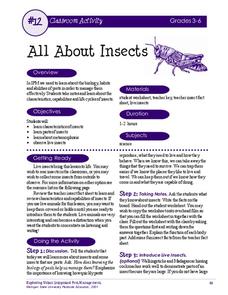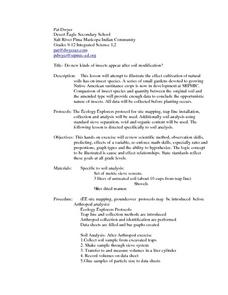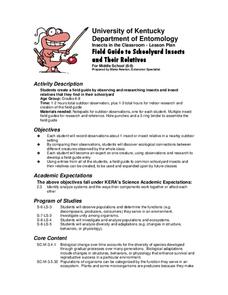Curated OER
My Insect Report
Is your class writing a report on insects? If they are, you have to check out this great set of worksheets. It provides a well-scaffolded system they can use to organize their research findings in order to compose a well-structured...
Curated OER
Insect or Arachnid?
Students compare and contrast the characteristics of insects and arachnids through research, observation, and discussion. They write accurate statements describing insect and arachnid life cycles and anatomies. Afterward, they listen as...
Cornell University
Insect IPM
Find out the characteristics that makes a bug an insect with a workbook designed to inform scholars about the crawly creatures that live around us. Scholars complete an ant-themed word search, answer questions using a solution key, and...
Scholastic
Minibeasts
Lead young scientists to discover insects outdoors. After investigating, students will record observations, learn about these fascinating creatures, craft, and role play.
Michigan State University
All About Insects
Insects are the focus of an activity that looks deep into the anatomy and metamorphosis of everyday bugs. Two worksheets reinforce knowledge obtained through a teacher-guided grand conversation and insect observation.
Curated OER
Insects A-Z!
Alphabet insects! Who has ever heard of such a thing? Get ready because your class is going to research insects that start with a specific letter of the alphabet. In small groups, they'll use the Internet and reference texts to locate...
Intel
Insects: The Good, The Bad, The Ugly
What would the world be like with no insects? Ponder this question using a research-based STEM unit that encourages scholars to investigate insects from both a beneficial and hazardous perspective. They learn about insect behaviors,...
Cornell University
Insect Anatomy
Young entomologists discover insect anatomy in a very detailed unit plan. Offering background information for teachers about various insects, class members explore the differences between bugs and insects—and yes, there are many...
Biology Junction
World of Insects: Characteristics, Orders, and Collecting
Every bug is an insect, but not all insects are bugs. A presentation lists the characteristics of insects, describes their body parts, and explains metamorphosis. It also details every order and includes photographs and multiple facts...
Curated OER
Build Your Own Insect Trap
Students ask testable questions. They explain the relationship between insect behavior and insect trapping techniques. Students design their own insect traps to collect a new unknown insect, in the same way that entomologists collect the...
Curated OER
Invent an Insect
Explore biology by researching adaptation. First, learners research and define a list of insect vocabulary terms and discuss the benefits of each insect characteristic. They then utilize a worksheet to create their own insect and share...
Curated OER
Insects
Introduce your unit on insects with this six-slide PowerPoint presentation. Characteristics of an insect are briefly discussed, including two informative diagrams. Tip: After showing this presentation, ask students to share what they...
Curated OER
Insect Anatomy
A wonderful lesson plan on the many benefits of having spiders and bugs around us. Learners discover how important these bugs are to our ecosystem. The lesson helps young biologists see the differences between spiders and caterpillars,...
Curated OER
Just Plain Buggy: Art and Science
Budding artists explore the shapes and parts that make insects so fascinating to study, then use what they see to create original insect inspired designs. They use wax, dye, and fabric to create their designs.
Curated OER
Which One is an Insect?
In this science learning exercise, students categorize 18 words as either insects or not insects. Students write the words in a two-column chart under the correct category.
Curated OER
Imaginary Insect Zoo
In this science worksheet, students create an imaginary zoo. Students write information about their imaginary insect, including its name, how it eats, hears, seeing, smells, and eats.
Curated OER
Field Guide to Schoolyard Insects and Their Relatives
Sometimes all you need to complete your perfect lesson plan is an awesome hands-on learning experience. Here is an extension activity that is sure to excite your learners. They'll head outside to observe the local insect community. When...
Curated OER
Insects?
Can you tell the difference between a bug and an insect? Aren't they the exact same thing? Let your learners explore, identify, classify, and document the differences they see in bugs and insects. The activity sheet suggests several...
Curated OER
Torn Insect Art
Sometimes the best way to drive home a concept is through an art project. Here is a quick and easy activity that can help learners remember or become more familiar with the parts on an insect's body. They tear brightly colored paper into...
Curated OER
Do new kinds of insects appear after soil modification?
Students explore and experiment with the concept do new kinds of insects appear after soil modification. They assess and review scientific methods of observation, predicting, variables, math skills, ratio, proportions, graphs and the art...
Curated OER
What Is An Insect?
Students find and classify insects. They collect insects, study them with a hand lens and identify its body parts. Afterwards, they discus various types of insects and thier Orders such as beetles, butterflies and moths, grasshoppers, etc.
Curated OER
Field Guide to Schoolyard Insects and Their Relatives
Your entire class works together to create an illustrated insect field guide. The intent is that they venture outside of the classroom, find a critter, and then research it using reference materials, insect books, and the Internet for...
Cornell University
Beneficial Insects
A lot of people think of insects as pests. But actually, some insects are beneficial because they get rid of pests! After learning about beneficial insects, class members research given insects to find out if they are pests or predators.
EnLiST
Trap Your Own Insects: What’s in Your Backyard?
Young entomologists construct three types of insect traps—pitfall, pollinator, and panel—before setting their traps out and observing what they caught. They then observe what types of insects the different traps attract.
Other popular searches
- K 2 Life Science Insects
- Science Insects
- Parts of Insects Science
- Life Science Insects
- Science Spiders vs Insects
- Esl Lessons Science Insects
- Esl Science Insects

























